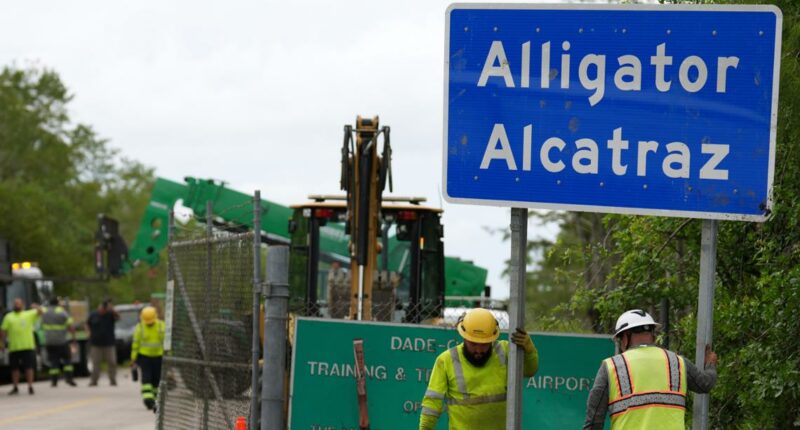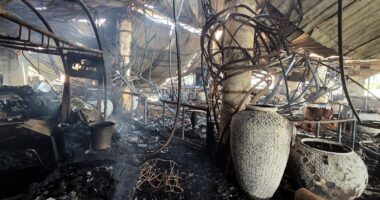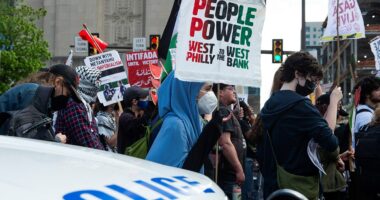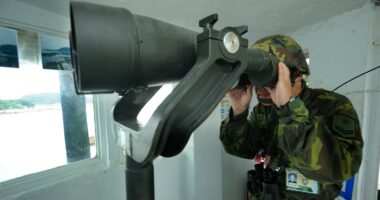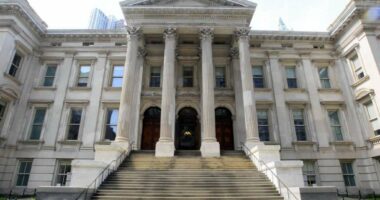Share this @internewscast.com
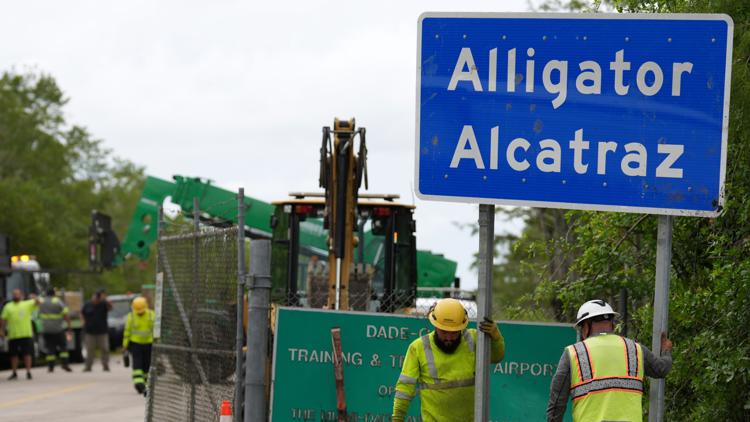
The facility can continue to operate and hold detainees for ICE, but workers are prohibited from undertaking any new filling, paving, or infrastructure work for the next 14 days.
MIAMI — A federal judge on Thursday temporarily halted construction at an immigration detention center — situated within the Florida Everglades and nicknamed “Alligator Alcatraz” — as debates continue over whether environmental laws have been breached.
The facility may still function and house detainees for U.S. Immigration and Customs Enforcement, but workers are restricted from beginning any new filling, paving, or infrastructure work for the upcoming 14 days. U.S. District Judge Kathleen Williams made this ruling during a hearing and plans to release a written order later on Thursday.
Environmental groups alongside the Miccosukee Tribe have petitioned Williams to issue a preliminary injunction to cease operations and further construction. They assert the project endangers environmentally sensitive wetlands that host protected plants and animals and could negate billions of dollars in environmental restoration efforts.
Plaintiffs presented witnesses on Wednesday and Thursday to support the injunction, while state and federal government lawyers are scheduled to proceed next week.
After Thursday’s testimonies, Paul Schwiep, representing the environmental groups, urged Williams to issue a temporary restraining order to at least stop any new construction at the site while the preliminary injunction is being considered.
Williams asked Florida attorney Jesse Panuccio if the state would agree to halt construction so that she wouldn’t need to issue the restraining order. She pointed out that anything built at the site would likely remain there permanently, regardless of how the case was ultimately decided.
Panuccio said he couldn’t guarantee that the state would stop all work.
This sparked an hour-long hearing about the temporary restraining order, which will be in place for the next two weeks while the still ongoing preliminary injunction hearing continues.
The crux of the plaintiffs’ argument is that the detention facility violates the National Environmental Policy Act, which requires federal agencies to assess the environmental effects of major construction projects.
Panuccio said during the hearing that although the detention center would be holding federal detainees, the construction and operation of the facility is entirely under the state of Florida, meaning the NEPA review wouldn’t apply.
Schwiep said the purpose of the facility is for immigration enforcement, which is exclusively a federal function. He said the facility wouldn’t exist if it wasn’t for the federal government’s desire for a facility to hold detainees.
Williams said Thursday that the detention facility was at a minimum a joint partnership between the state and federal government.
The lawsuit in Miami against federal and state authorities is one of two legal challenges to the South Florida detention center which was built more than a month ago by the state of Florida on an isolated airstrip owned by Miami-Dade County.
A second lawsuit brought by civil rights groups says detainees’ constitutional rights are being violated since they are barred from meeting lawyers, are being held without any charges, and a federal immigration court has canceled bond hearings. A hearing in that case is scheduled for Aug. 18.
Under the 55-year-old federal environmental law, federal agencies should have examined how the detention center’s construction would impact the environment, identified ways to minimize the impact and followed other procedural rules such as allowing public comment, according to the environmental groups and the tribe.
It makes no difference that the detention center holding hundreds of detainees was built by the state of Florida since federal agencies have authority over immigration, the suit said.
Attorneys for federal and state agencies last week asked Williams to dismiss or transfer the injunction request, saying the lawsuit was filed in the wrong jurisdiction. Even though the property is owned by Miami-Dade County, Florida’s southern district is the wrong venue for the lawsuit since the detention center is located in neighboring Collier County, which is in the state’s middle district, they said.
Williams had yet to rule on that argument.
The lawsuits were being heard as Florida Republican Gov. Ron DeSantis ′ administration apparently was preparing to build a second immigration detention center at a Florida National Guard training center in north Florida. At least one contract has been awarded for what’s labeled in state records as the “North Detention Facility.”
Copyright 2025 Associated Press. All rights reserved. This material may not be published, broadcast, rewritten, or redistributed.
